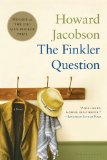
 Book Reviewed by:
Book Reviewed by:
Judy Krueger
Buy This Book
There are three good reasons to read The Finkler Question:
I have enjoyed just about every Booker Prize-winning novel I have read but during the build-up to the final announcement of this year's winner I was not betting on a book that was promoted as a humorous look at the many ways of being Jewish. In fact, having read and reviewed here at BookBrowse two of the books on the shortlist, The Long Song and Room, I was sure one of those would win. As it turned out I have been privileged to read a great novel I would otherwise have passed over.
A word about the title, which is in itself a joke but is not explained until a couple of chapters into the book - Julian Treslove, the wannabe Jew in the story, had never met a Jew until he met Sam Finkler at school. He was so impressed that he decided "Finkler…was a better name for them than Jew…It took away the stigma…(t)he minute you talked about the Finkler Question…you sucked out the toxins." Before I read those lines I was somewhat put off by the title, feeling that I didn't know what I was getting into.
What you will get into should you decide to read The Finkler Question is a look into modern-day anti-Semitism as it exists in Great Britain. British readers will undoubtedly see the book differently than readers in other countries, but any reader who has some awareness of current events regarding the Israeli/Arab conflict will get it. While political questions are part of the story, they play out through the interactions between male and female characters who are so well defined and uniquely human that you wonder at Howard Jacobson's level of wisdom and compassion for people.
I was never sure where the story was heading but I always wanted to find out. The characters became people I felt I had known for years. They alternately made me laugh and worry so that while I sensed each one was ultimately doomed, I was consistently entertained as they stumbled towards their individual ends.
Both British and American critics have heaped praise on The Finkler Question. Reactions from the reading public have been more mixed - at the time of writing, reviews on Amazon in the US and UK average 3 stars with an uncannily equal spread of ratings from 1 to 5. It appears that an interest in, or some knowledge of Jews, anti-Semitism and Israel predisposes readers to a positive experience, but does not guarantee one. On balance, I think it is reasonably safe to say that most adventurous readers of literary fiction who also have a sense of humor will be pleased.
![]() This review is from the November 17, 2010 issue of BookBrowse Recommends.
Click here to go to this issue.
This review is from the November 17, 2010 issue of BookBrowse Recommends.
Click here to go to this issue.
Nonfiction

It's Easier to Reach Heaven Than the End of the Street, Emma Williams: 2010 memoir - an invaluable book for anyone wishing to understand the tensions in the region; particularly notable for the author's ability to boil down the situation's complexities into easily understandable and relatable prose.
A Tale of Love and Darkness, Amos Oz: A stunning 2004 memoir about the author's childhood in Israel with the back story of his parents and how they came from Europe as part of the Zionist movement.
Fiction:
Gentleman's Agreement, Laura Hobson: 1947 bestseller concerning the social and economic aspects of anti-Semitism in American life.

Exodus, Leon Uris: 1958 bestseller covers European anti-Semitism, the Jewish exodus to Palestine in the 19th and 20th centuries and the founding of modern Israel.
The Hope, Herman Wouk: 1993 novel relates the three Israeli-Arab wars between 1948 and 1967 including historical figures and fictional characters.
The Romance Reader, Pearl Abraham: 1995 novel about a young Jewish woman seeking to live outside her orthodox Hasidic upbringing.
The Yiddish Policeman's Union, Michael Chabon: 2007 alternative history/ murder mystery set in a temporary Jewish homeland in Alaska, includes Jewish identity issues and humor as well as the weight of family.
 36 Arguments For the Existence of God, Rebecca Goldstein: 2010 novel explores philosophy, religion and traditional Jewish life in modern times.
36 Arguments For the Existence of God, Rebecca Goldstein: 2010 novel explores philosophy, religion and traditional Jewish life in modern times.
To the End of the Land, David Grossman: 2010 anti-war novel in which a mother suffers through a war that has no end while her son reenlists in the Israeli army and brings us up to the present in this conflict.
![]() This review is from the November 17, 2010 issue of BookBrowse Recommends.
Click here to go to this issue.
This review is from the November 17, 2010 issue of BookBrowse Recommends.
Click here to go to this issue.
Your guide toexceptional books
BookBrowse seeks out and recommends the best in contemporary fiction and nonfiction—books that not only engage and entertain but also deepen our understanding of ourselves and the world around us.